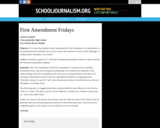
Have students bring articles on current events which either support or criticize the 1st Amendment
- Subject:
- Social Science
- Social Studies
- Material Type:
- Lesson
- Provider:
- School of Journalism
- Date Added:
- 09/07/2022

Have students bring articles on current events which either support or criticize the 1st Amendment
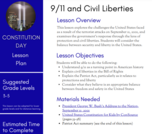
This lesson explores the challenges the United States faced as a result of the terrorist attacks on September 11, 2001, and examines the governmentâ"s response through the lens of protection and civil liberties. Students will consider the balance between security and liberty in the United States.
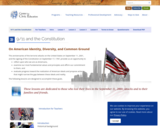
The anniversaries of the terrorist attacks on the United States on September 11, 2001, and the signing of the Constitution on September 17, 1787, provide us an opportunity to reflect upon who we are as Americans, examine our most fundamental values and principles and affirm our commitment to them, and evaluate progress toward the realization of American ideals and propose actions that might narrow the gap between these ideals and reality. The following lessons are designed to accomplish these goals.

The anniversaries of the terrorist attacks on the United States on September 11, 2001, and the signing of the Constitution on September 17, 1787, provide us an opportunity to reflect upon who we are as Americans, examine our most fundamental values and principles and affirm our commitment to them, and evaluate progress toward the realization of American ideals and propose actions that might narrow the gap between these ideals and reality. These lessons are designed to accomplish these goals.
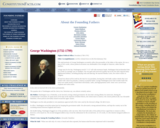
Read information about the "Founding Fathers" of the United States of America, including George Washington, James Madison, Thomas Jefferson, John Adams, Benjamin Franklin, Alexander Hamilton, George Mason, Gouverneur Morris, Roger Sherman, James Wilson, and Edmund Randolph.
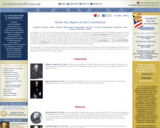
On September 17, 1787, the Constitutional Convention came to a close in the Assembly Room of Independence Hall in Philadelphia, Pennsylvania. There were seventy individuals chosen to attend the meetings with the initial purpose of amending the Articles of Confederation.
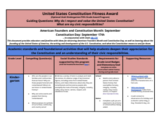
This is an optional program for use by Utah LEAs, schools, and teachers to observe Founders Month and Consitution Day. It aligns with and supports mastery of many Utah Core Social Studies Standards in grade K-5. Standards alignment is provided, along with resources for possible use.
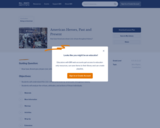
How have Americans shown civic virtues throughout history?

A challenging, fun card game that helps students learn about their rights under the Bill of Rights, the first 10 amendments to the Constitution. The game offers three levels of play: Easy, Normal, Difficult.

Articles of Confederation- A brief description of the AofC and some short videos.
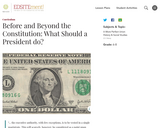
In this curriculum unit, students look at the role of President as defined in the Constitution and consider the precedent-setting accomplishments of George Washington.
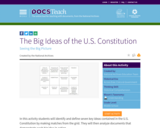
In this activity students will identify and define seven key ideas contained in the U.S. Constitution by making matches from the grid. They will then analyze documents that demonstrate each big idea in action.
This activity is designed to prepare students for the Constitution-in-Action Learning Lab at the National Archives in Washington, DC. It is a part of a package of pre-visit activities associated with the lab experience.
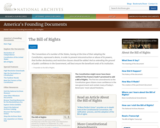
The Constitution might never have been ratified if the framers hadn't promised to add a Bill of Rights. The first ten amendments to the Constitution gave citizens more confidence in the new government and contain many of today's Americans' most valued freedoms.

Rap song on the Bill of Rights, hosted by Smart Songs, an educational music group, creating songs about history, social studies, geography, and science---providing kids and teachers with content that makes learning fun. ABC News Los Angeles and The Boston Globe have described the group as the current version of Schoolhouse Rock.

In this game, test your knowledge of the branches of the U.S. government!

This game immerses students in the workings of our three branches of government. Players take on the roles of legislator, president and Supreme Court justice to get constitutional laws enacted. Players must juggle several bills at once while holding press conferences and town hall meetings.

This project provides students with an opportunity to apply and showcase what they have learned throughout their study of the Being an American curriculum. Students will identify a topic related to the curriculum that they wish to learn more about, research that topic, and then develop a product to share with the class on an assigned date.
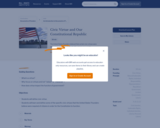
The United States Founders believed that certain civic virtues were required of citizens in order for the Constitution to work. Numerous primary sources—notably the Federalist Papers and the Autobiography of Ben Franklin—point us to the "Foundersâ" Virtues." Before exploring the Documents of Freedom, it is important to understand civic virtue as an essential element of self-government.
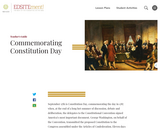
September 17th is Constitution Day, commemorating the day in 1787 when, at the end of a long hot summer of discussion, debate and deliberation, the delegates to the Constitutional Convention signed America's most important document.
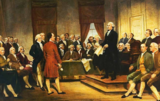
This activity is designed to help students understand the debates at the Constitutional Convention in 1787 that shaped America’s legislative branch of government. The primary goal of this activity is for students to discover how a compromise balanced the needs of large states and small states and how this led to the creation of the current House of Representatives and Senate.